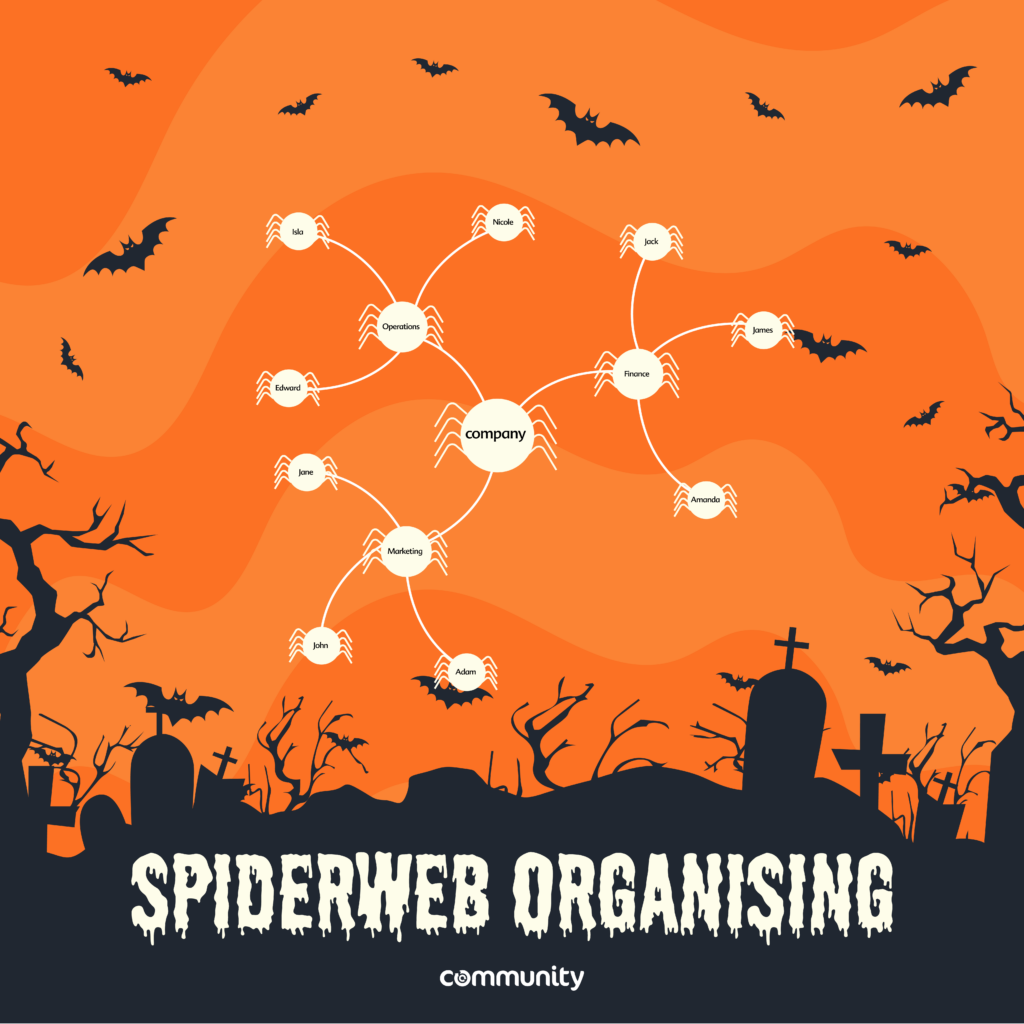
As we approach Halloween, a season of webs and shadows, we can consider the potential of spider web organising as a tactic for union reps. Like a spider weaving its intricate web, our efforts to organise and recruit members must be strategic, interconnected, and resilient.
Spider web organising is about using each connection within a workplace or community as a thread to build a stronger, more robust network of members.
What is Spider Web Organising?
At its core, spider web organising is a method where reps don’t solely focus on isolated individuals, but instead view each person as a vital part of a larger network akin to a spider web.
Every member has relationships and ties with others, and through these relationships, we can spread Community’s influence and reach across the workplaces and sectors we represent. One conversation leads to another, each one forming a new thread that connects us to more potential members. The key to this approach is understanding the natural flow of communication within a workplace and using it to our advantage.
These nodes are the influential workers – the ones that others turn to for advice, the informal leaders. By engaging with these key people, we can create new lines of communication that ripple outwards, draw in others, and expand the web. This method is particularly effective because it relies on relationships of trust which already exist, making recruitment feel less like a cold call, and more like a personal invitation.
By mapping these networks, we can ensure that there is no part of the workplace that is left out or lacks communication or engagement with the union. In fact, the more connected the web becomes, the more everyone who is part of it feels part of it, making our union stronger to overcome the challenges that our members face in their daily working lives.
Reps can identify key influencers within the workplace and use them to spread information about Community’s benefits and any upcoming events, whether that is through one-to-one conversations, small group meetings, or even social media groups, spider web organising is about making the most out of every connection, and just like the spider, once the web is set, it works for us – each new member strengthens our position and makes the next conversation easier. For Community, this means more members, stronger representation, and greater influence across sectors and industries.
How to use Spider Web Organising in your workplace
- Identify key contacts including individuals who have considerable influence among their peers who can spread the word about Community.
- Build relationships with potential members to understand their needs and concerns. Reps can build relationships using breaks and after-work gatherings to speak to colleagues to identify issues currently happening in the workplace.
- Utilise existing networks such as social media and local community groups to expand Community’s reach.
- Inform members and potential members of Community’s advice, representation, and support services.
- Encourage members to take ownership of the branch by allowing them to contribute to key decisions so they feel part of Community.
Use Spider Web Organising in your workplace today
By strategically organising your branch, the branch will become more impactful by making changes across the workplace. Download our spider web organising template today to help map out your workplace and get organising today.
For more information on spider web organising, or if you would like support in developing an organising strategy in your workplace, contact us at organising@community-tu.org.
Thank you. We have received your query
We have received your query and a member of our Service Centre Department will be in touch to discuss further with you.
Due to service demands it is not always possible for our advisors to reply to your query immediately. We aim to respond within 48 hours of receipt.
If your employer has invited you to a formal meeting (disciplinary, grievance or appeal) and you are seeking representation, if you have not already done so via this form, please provide us with all relevant supporting information including any notes/minutes from any investigation process and your email/letter of invitation, which should include full details of when and where the meeting is due to take place.
Please note that representation is not provided for investigation meetings.
If you have any further queries, please contact our Service Centre Department on 0800 389 6332 or at servicecentre@community-tu.org.
Not a member?
Let’s get to know each other.
"*" indicates required fields
"*" indicates required fields